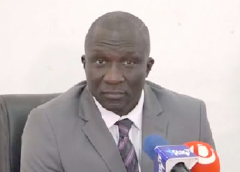
The White Paper released by Civil Society Organisations (CSO) has urged government to demonstrate political will to obtain justice for victims of human rights violations under the 22 years regime of former President Jammeh.
The Civil Society Oganisation (CSO) working group on transitional justice, doubling as victims and victim-led organisation in a press conference yesterday said: “Government should not try to rely on the principle of retroactivity as it does not negate the need to comply with international laws when dealing with crimes against humanity.”
More on the recommendations, the report stated that government must expedite capacity building of the Ministry of Justice (MoJ) including a director and deputy director and create an independent national public prosecution authority with the power to investigate and effectively lead prosecution of crimes and ensure justice is served.
The report further posited that prosecution of individuals, including security officials implicated in human rights violations is essential to serve as a deterrent and address impunity.
The report stated that the CSO had hoped for the recommendations that would speak to accurate records of human rights abuses of the past regime; prosecution and punishment of persons found guilty of crimes against humanity; national peace; reconciliation; support for victims and their families to overcome the long held pain.
According to the report, with findings and recommendations of the TRRC, it is now apt for the government to create a human rights culture in the Gambia; to look onto the perspectives of victims; their families and victim-led organisations, as well as members of the public that participated in the consultations.
“It is essential that victims remain in the driver’s seat of the transitional justice process and steer government’s engagements and actions in the various stages”, the report pointed out.
However, the report added that not only should implementation of the recommendations be coordinated by an entity or committee that remains to be defined, but it is critical that government puts in place mechanisms through which to provide periodic updates to the victims’ community and the general populace about the post TRRC work.
In addition, the report emphasised that international law is very clear that governments have a legal duty to investigate and prosecute torture and crimes against humanity, while adding that there should be accountability to ensure non-recurrence of human rights violations.
Moreover, the report stated that the release of the CSO White Paper ahead of the publication of the Government’s White Paper presents unique and unprecedented opportunities in the country’s transitional justice trajectory, which will contribute to building synergies and harness the role of civil society as watchdogs.
Additionally, the report points out that its publication serves as one of the many ways CSOs can exert pressure on government and ensure that the government’s position on the recommendations would be influenced significantly and help in achieving a more comprehensive White Paper from the government.
The report further disclosed that the CSO White Paper is not an analysis of the TRRC’s report but is aimed at capturing victims’ and civil society’s views around the TRRC recommendations.





